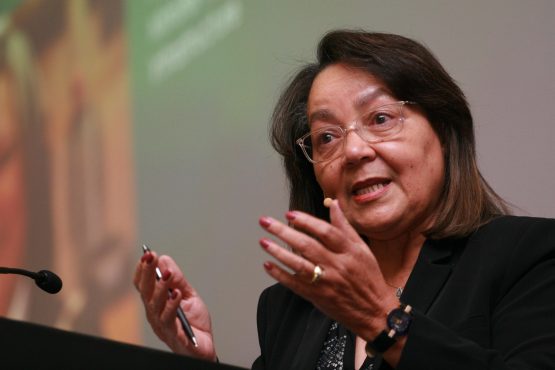Nearly 4,000 employees in Minister Patricia de Lille’s department of public works cash in through doing business with government, she revealed.

Revelations by public works minister Patricia de Lille yesterday that 3,700 of her employees were doing business with her department has pointed to a far bigger problem within the civil service than previously realised.
De Lille also noted 300 employees in her department had their own companies which were doing business with her department in an interview with 702 yesterday.
“This is where corruption and irregular expenditure begins, when employees are more concerned about their own interests and the profits of their own companies or that of relatives,” Outa chairperson Wayne Duvenhage told The Citizen.
So while we wait for answers from the Public Service Commission (PSC – the department of public service and administration (DPSA) referred The Citizen to the PSC, which referred us back to the DPSA), how much is all this costing?
Up to R8 billion, according to an outraged David Ross, DA spokesperson for Scopa.
His response was back in 2018.
Two years and 3,700 employees in one department alone, the real figure is anyone’s guess.
De Lille’s spokesperson said she would have a cost estimation today for her department.
“Minister of Finance Nhlanhla Nene has revealed shocking statistics which show that 2 704 state employees were actively doing business with National and Provincial government Departments during the period 1 April 2017 to 31 January 2018, to the tune of R8 billion,” Ross said.
The revelation was made in a 2018 Public Procurement Review, of which there appeared to be no 2019 version.
“OUTA hopes that every single name mentioned by Ms De Lille is thoroughly investigated and if found to be in contravention of this law, are summarily dismissed.”
The law Duvenhage is referring to is the Public Administration Management Act (Pama), which was “operationalised” by a proclamation issued on March 1, 2019, “thereby prohibiting Public Service employees, public administration employees and special advisors from conducting business with the State,” according to the DPSA annual report for 2018/19.
“Contravention of Section 8 of PAMA, 2014 is considered a criminal offence for all employees in the three spheres of government and any person found guilty will be liable to pay a fine or imprisonment of a period not exceeding 5 years. The offence, furthermore, constitutes a serious misconduct which may result in the termination of employment by the employee.”
Strong words, and it appeared there was also little excuse for hand-wringing and pleas of ignorance.
“Numerous consultative workshops were conducted to support the development of a Directive on Other Remunerative Work by departments to prohibit public servants from doing business with the State,” the DPSA said.
There’s more law, too.
“The Revised Code of Conduct, which came into effect on 1 August 2016, seeks to prohibit public servants from doing any form of business with organs of state, whether in their own capacity as individuals or through companies in which they are directors,” said then public service committee chairperson Dr Makhosi Khoza.
“The 2016 Public Regulations provided for a transitional arrangement enabling public servants who were doing business with the state to either resign from the public service or relinquish their business interest by the 31st of January 2017.”
In January 2017 the directive on conducting business with an organ of state was issued which made clear in a terse, unusually short eight-page piece of legislation that doing “any business, trade, occupation, profession, calling, industry or undertaking of any kind” as a government employee without permission from the employee’s minister was not allowed.
In a 2018 presentation to parliament, it noted in February 2017 that National Treasury had found 8,495 public service employees to be registered on the Central Supplier Database (CSD), made up of 5,366 from provinces and 3,129 from national departments.
“From the 8 495 public service employees listed, 580 employees were actually conducting business with an organ of state,” the report stated.
“At the end of March 2018, National Treasury found 15 070 public service employees to be registered on the CSD: 10 315 from provinces and 4 755 from national departments.
“From the 15 070 public service employees listed, 679 employees were actually conducting business with an organ of state (183 from national departments and 496 from provincial departments)”.
As for prosecutions, these appear to be sparse at this stage.
According to notes by Parliamentary Monitoring Group, those confirmed to be breaking the law “would be handed over in batches to the SAPS and National Prosecuting Authority (NPA) for investigation and prosecution”.
“On 24 June, the first 20 public service employees who were conducting business with the state had been handed over to the SAPS and the NPA for further investigation and prosecution,” DPSA director general Richard Levin told parliament in November.
“On 2 September, SAPS and the DPSA convened a meeting to discuss progress on these cases, and it had been resolved that the NPA would be included in the next meeting to develop prosecution strategies,” Levin said.
“The DPSA was also in the process of finalising another 20 names of employees to be handed over to the SAPS before the end of November 2019.”
The Departments of Telecommunications & Postal Services, Government Communication and Information Systems, Tourism, Trade and Industry, Science and Technology, the DPSA, Eastern Cape Safety & Liaison, and the Department of Human Settlements were also alleged to have employees doing business with their departments.
“There is a challenge with regards to compliance to the prohibition of Public Service employees conducting business with an organ of state,” the DPSA noted in its annual report.
“Although numerous letters were issued to departments to identify employees who are possibly conducting business with an organ of state and a request to take action against them, only 20 departments (10 provincial and 10 national) have responded.
“In general, those departments who did respond failed to request employees who were registered on the Central Supplier Database to deactivate their registration.”
For more news your way, download The Citizen’s app for iOS and Android.
Support Local Journalism
Add The Citizen as a Preferred Source on Google and follow us on Google News to see more of our trusted reporting in Google News and Top Stories.








